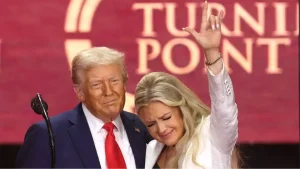Jasmine Crockett Faces Backlash Over False Claims About Charlie Kirk on Memorial Day
Rep. Jasmine Crockett (D-Texas) sparked widespread controversy after making public remarks about conservative activist Charlie Kirk on the day of his memorial in Glendale, Arizona. Kirk, founder of Turning Point USA and a prominent voice in conservative politics, was fatally shot on September 10 during a speaking event at Utah Valley University.
During an appearance on CNN’s State of the Union, Crockett defended her vote against a House resolution honoring Kirk and refused to offer sympathy for the late activist. She described Kirk as a “racist bigot” who, she claimed, targeted people who did not look like him—a claim widely disputed by colleagues and political commentators.
“The rhetoric that Charlie Kirk continuously put out there was rhetoric that specifically targeted people of color,” Crockett said. “So it is unfortunate that even our colleagues cannot see how harmful his rhetoric was, specifically to us (people of color).”
Crockett’s Personal Grievance
Crockett cited personal grievances as part of her reasoning for opposing the resolution. According to her, Kirk had previously criticized her publicly, accusing her of involvement in the so-called “Great Replacement” theory.
“And I can tell you that a month prior to him passing away…He was talking negatively about me, directly,” Crockett said. “So, if there was anyone I was going to honor, somebody who decided they were just going to negatively talk about me and proclaim that I was somehow involved in the ‘Great White Replacement,’ yeah, I’m not going to honor that kind of stuff.”
She further noted that only two white lawmakers voted against the Kirk resolution, implying a partisan dimension to the vote.
National Attention and Partisan Divide
Crockett’s remarks come amid heightened national scrutiny of political violence and rhetoric. The assassination of Kirk has drawn sharp partisan lines, with Republicans blaming Democrats for inciting a hostile environment, while Democrats highlight alleged far-right extremism linked to Trump-era rhetoric.
A former Democratic senator, Joe Manchin of West Virginia, weighed in, suggesting that President Donald Trump is the only political figure capable of uniting the country after Kirk’s assassination.
“President Trump is the person who can basically bring us together,” Manchin told Fox News anchor Martha MacCallum. “I’m praying that he’s able to say ‘listen, enough’s enough. C’mon, we’re all Americans. We’ve gotta live in this world together and our country, and keep it the greatest country on earth.’”
Manchin, a retired senator known for his centrist positions, emphasized that he believes Trump can help de-escalate political tensions and calm the highly polarized national climate.
“I’m really hoping. I believe in him. I believe he can do that, and with that being said, he’s able to calm down all this rhetoric right now. And for those who want to still spew it? That’s fine, it’s gonna show you being on the extreme,” Manchin added.
Partisan Tensions on Capitol Hill
The debate over Kirk’s legacy spilled over into Congress this week, reflecting ongoing partisan tensions. Members of the so-called “Squad,” including Rep. Rashida Tlaib (D-Mich.), once again accused Republicans of fascism—a claim met with immediate pushback from GOP lawmakers.
Rep. Byron Donalds (R-Fla.) clashed with Tlaib during a committee hearing in a fiery exchange that highlighted the deep ideological divide in Washington.
“Squad” Rep. Rashida Tlaib insisted that being labeled a fascist is “not a bad word” if accurate, prompting a near-minute-long argument with Donalds as the committee chair attempted to restore order.
The heated exchanges underscore how Kirk’s death has intensified partisan battles rather than fostering bipartisan reflection.
The Kirk Memorial and Public Reaction
Thousands of Americans attended Kirk’s memorial, with former President Donald Trump delivering a high-profile tribute. Despite the solemn occasion, Crockett’s comments during the same period drew sharp criticism from conservatives and some Democrats alike. Social media erupted with disapproval, highlighting the tension between honoring a fallen activist and ongoing political disputes.
Observers have noted that Crockett’s accusations are factually dubious, with no credible evidence supporting her claims that Kirk targeted people of color or personally attacked her. Nevertheless, her statements have added fuel to a debate already inflamed by national polarization.
Broader Implications
Crockett’s comments reflect a wider trend in American politics where personal grievances and partisan narratives intersect, often overshadowing attempts at unity or remembrance. The backlash to her remarks demonstrates how sensitive and contentious discussions about political figures can become, particularly when they involve violent tragedies.
Experts in political communication suggest that statements like Crockett’s risk alienating constituents and deepening divisions rather than fostering constructive dialogue. Analysts note that public officials’ words carry weight, particularly when issued during events of national significance such as the memorial of a widely recognized activist.
Conclusion
Rep. Jasmine Crockett’s statements about Charlie Kirk on the day of his memorial have sparked a heated debate over both the legacy of the conservative activist and the role of rhetoric in American politics. By labeling Kirk a racist and citing personal grievances as justification for her vote against honoring him, Crockett has drawn national attention and controversy.
Meanwhile, figures like Joe Manchin have emphasized the importance of leadership capable of bridging political divides, highlighting the stark contrast between calls for unity and partisan accusations. As the nation continues to grapple with the implications of Kirk’s assassination, Crockett’s remarks serve as a reminder of how deeply political polarization shapes public discourse.

James Jenkins is a celebrated Pulitzer Prize-winning author whose work has reshaped the way readers think about social justice and human rights in America. Raised in Atlanta, Georgia, James grew up in a community that instilled in him both resilience and a strong sense of responsibility toward others. After studying political science and creative writing at Howard University, he worked as a journalist covering civil rights issues before dedicating himself fully to fiction. His novels are known for their sharp, empathetic portraits of marginalized communities and for weaving personal stories with broader political realities. Jenkins’s breakout novel, Shadows of Freedom, won national acclaim for its unflinching look at systemic inequality, while his more recent works explore themes of identity, resilience, and the fight for dignity in the face of oppression. Beyond his novels, James is an active public speaker, lecturing at universities and participating in nonprofit initiatives that support literacy and community empowerment. He believes that storytelling is a way to preserve history and inspire change. When not writing, James enjoys jazz music, mentoring young writers, and traveling with his family to explore cultures and stories around the world.









